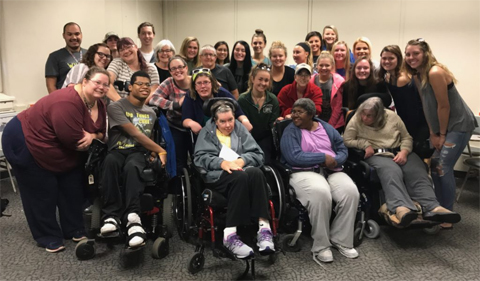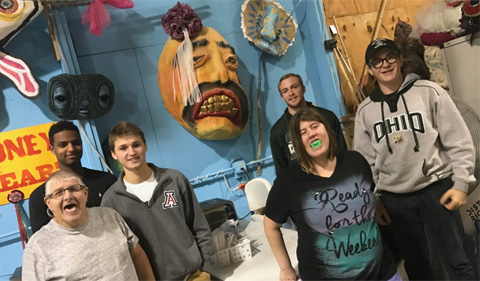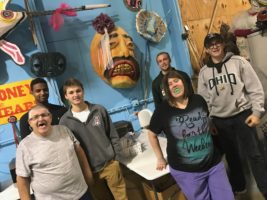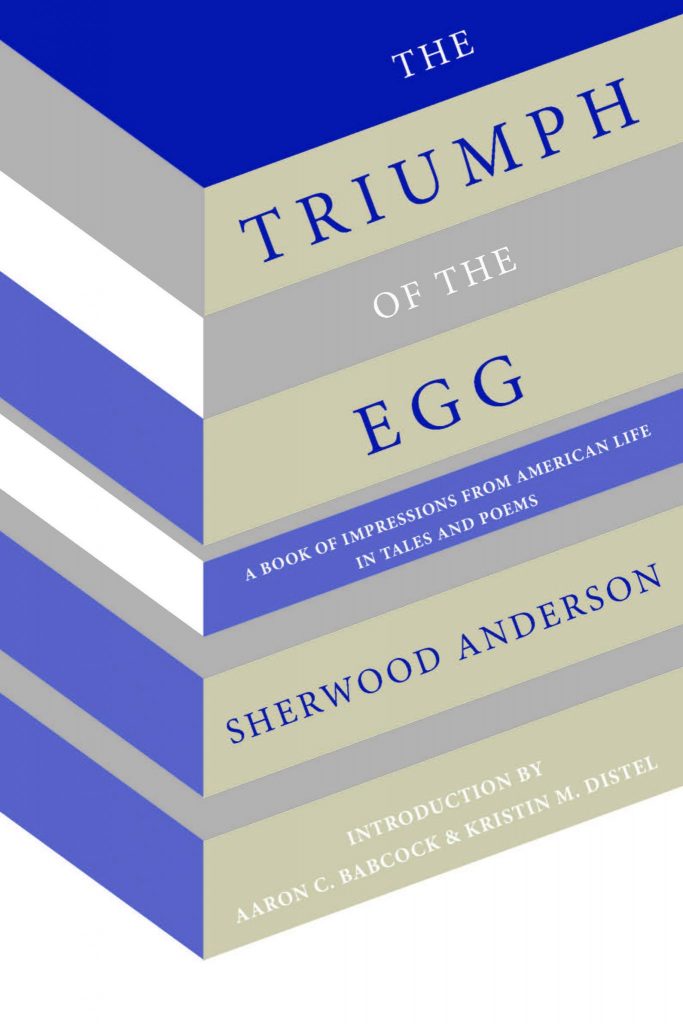
Hackworth’s students and their Echoing Connections writing partners
by Kristin M. Distel
“This was one of the best things I could have done,” says freshman Alexandra Petrovski, a student in Deni Naffziger Hackworth’s Writing and Rhetoric I course. Hackworth’s students spent five class sessions volunteering at Echoing Connections, a local facility that provides day habilitation services and life skills training to people with disabilities.
For five weeks, Hackworth’s students spent one class session per week working alongside adults at Echoing Connections. Hackworth paired her students with adults, and together, they completed various writing projects.
“The vast majority of the students wanted more time at Echoing Connections,” Hackworth notes.
“I got the chance to see how amazing it is to work with these people and hear their stories,” Petrovski continues. “I would recommend doing more activities like this. Not only can you see that they love it, but the students end up doing so as well.”
‘An Amazing and Touching Experience’
“This was a great experience,” says freshman Karlee Lanthorn. “It allowed us to work with people we probably would not work with every day. I was amazed that this experience went so well. I believe that it is very fun and that it should be done every single semester. It felt so good to walk in every day and see their smiles just light up! It made me feel so good knowing they were looking forward to the writing days. It was an amazing and very touching experience.”
Indeed, the service-learning project benefits students and adults alike. “The adults with disabilities are so excited, and the students often tell me that they become better communicators with everyone—not just with their Echoing Connections partners—as a result of this project,” Hackworth remarks.
The course culminates in a celebration of the class’s successes and an appreciation for the adults’ progress.
“At the end of the semester, we come together with the writing that the teams have composed, and we usually have a party in the classroom. We hold a public reading of the pieces,” says Hackworth.
One Class, Two Goals
The goals of this service-learning project, Hackworth notes, are two-fold. First, the students have the opportunity to help adults with disabilities express their ideas in writing. Together, they compose stories, poems, and other written texts. This significantly improves the students’ own writing, as it puts them in the role of an instructor.
“Some of the adults cannot write or speak clearly, so the students have to slow down their speech and their interactions. The students learn how to communicate more clearly, and they learn what follow-up questions to ask. This helps them with their own writing. We instructors are constantly asking students to include concrete details in their work, and the students are asking their adult writing partners to do the same thing,” Hackworth says. “This is sometimes a ‘light-bulb moment’ for students.”
The second goal for the service-learning project, Hackworth states, is even more ambitious: Hackworth hopes that the students become more aware of cultural divides and the “us versus them” mentality that so often halts productive lines of communication or feelings of empathy. Hackworth taught a similar service-learning project for 10 years at Hocking College with great success.

Hackworth’s students have formed close bonds with their Echoing Connections writing partners
‘You Never Have to Apologize for Who You Are’
Hackworth’s students praise the service-learning project and remark that their work at Echoing Connections has left a lasting impression.
“During my experience at Echoing Connections, I worked with Eli,” freshman Brittany Watson says, “and he probably is one of the sweetest people I have ever met. He made the experience very fun. He lit up the room with joy and laughter. It was a great experience for our group.”
Hackworth’s stories of the bonds formed between adults with disabilities and students are profoundly heartwarming.
“Several years ago, one of my young male students wanted to write hip-hop with his partner, and I said ‘Go for it.’” However, the student didn’t immediately connect with Ron, the adult,” Hackworth notes. “Ron didn’t speak clearly, and the two had trouble communicating with one another. The student told me, ‘I can’t do this,’ but I asked him to try just one more time.”
“On the second day—I peeked in on them. Ron was trying to talk; he was drooling, and he was apologizing for this. The student wiped Ron’s mouth with a napkin and said, ‘Buddy, you never have to apologize for who you are.’”
Hackworth also recalls a student and adult team who bonded over loss. In a previous semester, shortly before Valentine’s Day, one of Hackworth’s students was working with an adult named Fred.
“The student asked Fred if he was going to attend the upcoming Valentine’s Day dance. Fred said he wasn’t going because his girlfriend was sick. The student responded, ‘She’ll probably be okay.’ Fred explained that his girlfriend had brain cancer. My student said, ‘Well, let’s write her a love poem.’ That’s exactly what they did.”
“This class doesn’t promise warm, fuzzy feelings like these, but it does promise that students will learn how to empathize and how to communicate more effectively,” Hackworth says.
Preparing Students for the Medical Field
Hackworth is teaching learning community courses, which means that her classes consist of students who share a major or area of professional interest. Many of her students, Hackworth explains, are interested in the medical field. For this reason, it is especially important for them to learn how to communicate with adults with disabilities.
“My students will serve a large number of people with disabilities,” Hackworth remarks. “They will enter the medical field, human services, social services, the legal field, and other, related areas. Students don’t receive training for working with people with disabilities, and even many doctors don’t know how to speak to people with different cognitive abilities. This service project is for the greater good as well as for students’ own good.”
Students are also surprised to learn, Hackworth explains, the degree of discrimination that has existed against adults with disabilities.
“This is one of the last realms of civil rights,” she says. “Students are always stunned to learn that until 1978, the disabled could be openly and legally discriminated against. Until 1978, for example, a manager could ask a person with disabilities to leave a restaurant if a customer felt uncomfortable eating near a person with disabilities. Many students have little experience with or awareness of this,” she explains.
The students’ experiences at Echoing Connections provide a great deal of material about which to write. “They’re reading articles and stories, as well as viewing documentaries about disabilities. Overall, they’re learning about human rights.”
Fostering a Sense of Empathy
The students’ work at Echoing Connections has taught them lasting lessons.
“I had a great experience working with [my partner] Eli from Echoing Connections,” says freshman Ashley Greenlee. “It opened my eyes and made me realize how truly precious these people are and how much I enjoy working with them. I may even want to pursue a career someday or work on the side with those who have disabilities. It makes me feel so good knowing I was a part of this and making Eli smile. Just talking to him and asking him questions that we later formed into a poem and read to him made him so happy. I got attached to him and plan on coming back sometime to volunteer there. This was an experience I’ll never forget. I really enjoyed this.”
One of the greatest joys of this project, Hackworth notes, is seeing the connections students make with their partners.
“They learn from volunteering that they do have things in common with adults with disabilities. They have similar dreams. They all care about their families, and they want to be loved. They want to take vacations. They’ve experienced loss and grief. We tend to think people with disabilities don’t feel as deeply, but students are learning that that is incorrect,” says Hackworth.

Hackworth’s students have formed close bonds with their Echoing Connections writing partners
Hackworth recalls a particular instance in which a man at Echoing Connections revealed to a student that his best friend had just passed away. “The student reached out and held the man’s hand,” Hackworth says. “That was a real human connection.”
‘This is my life’s work’
“I feel like this is my life’s work,” says Hackworth, whose sister has a disability and has encountered doctors who struggle to communicate effectively. Leading students in this service-learning project will eventually help prevent the problems that Hackworth’s sister has encountered, she notes.
“People often ask, ‘What is wrong with our culture?’ My response is that there’s not enough one-on-one, not enough listening and getting to know others,” Hackworth says. The students’ service-learning project is one step toward understanding what it is like to walk in another person’s shoes.



















One Comment